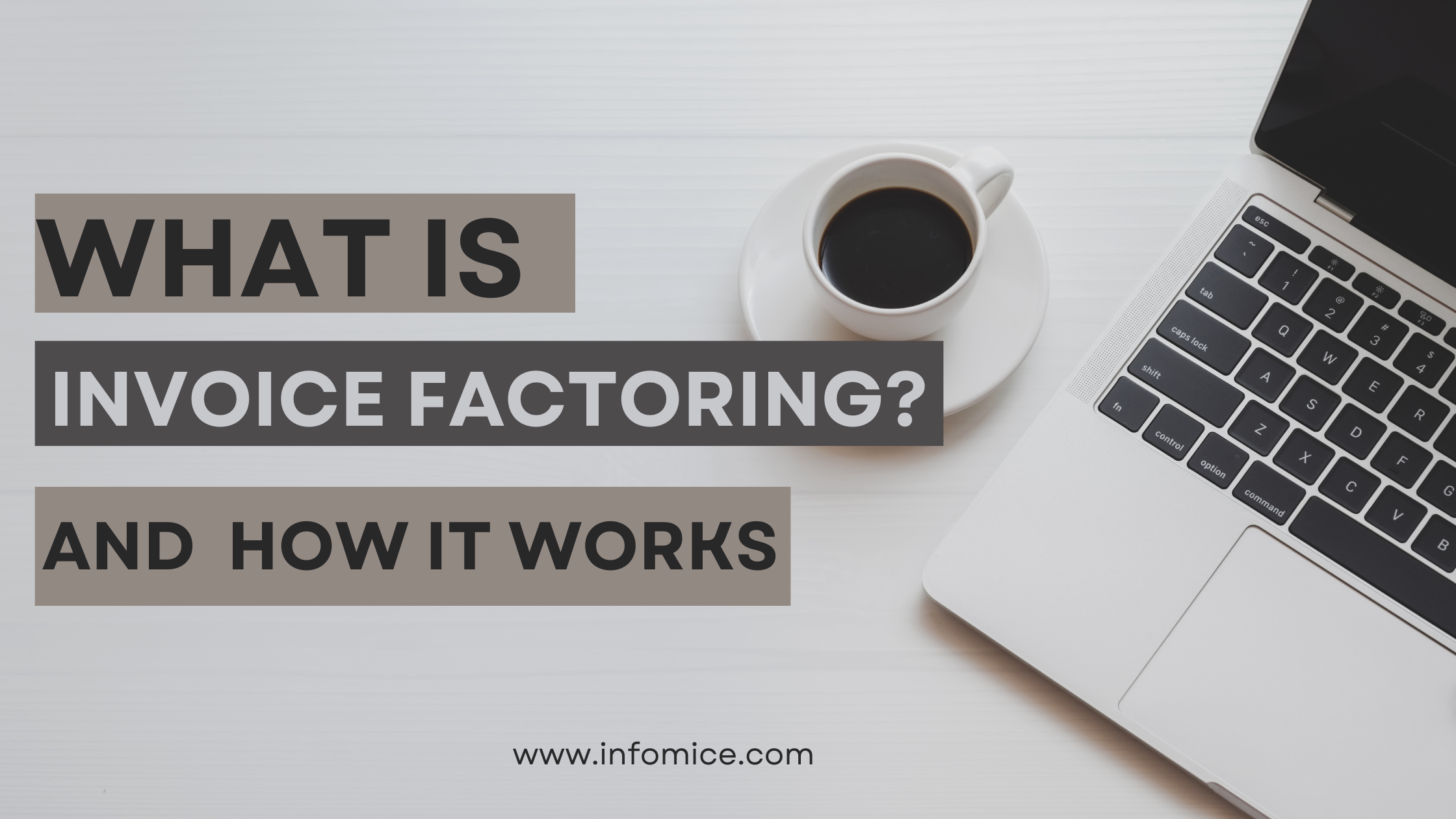
Running a business often involves waiting for customers to pay their invoices, which can create cash flow issues. Invoice factoring is a financial solution that helps businesses overcome these challenges. In this guide, we’ll explain how invoice factoring works, its benefits, and how it can be a game-changer for your business. We’ll also integrate related keyword phrases to ensure the content is authoritative and optimized for search engines.
What is Invoice Factoring?
Invoice factoring, also known as accounts receivable factoring, is a financial transaction where a business sells its outstanding invoices to a factoring company at a discount. This allows the business to receive immediate cash, rather than waiting for the invoices to be paid by the customers. It’s a form of asset-based financing that can significantly improve cash flow and operational efficiency.
How Does Invoice Factoring Work?
1. Choosing a Factoring Company: The first step is selecting a reputable factoring company that offers terms suitable for your business needs. Factors to consider include the advance rate, factoring fees, and the company’s reputation. Keywords to note here are “factoring services,” “factoring company reviews,” and “best-factoring companies.”
2. Submitting Invoices: Once you’ve partnered with a factoring company, you submit the invoices you wish to factor. This involves providing details about the invoices, including the amounts and the customers. Related terms include “invoice submission process,” “accounts receivable,” and “invoice factoring application.”
3. Verification: The factoring company reviews and verifies the invoices. They may contact your customers to confirm the validity of the invoices and ensure that they are not disputed. This process involves “invoice verification,” “customer credit check,” and “due diligence.”
4. Advance Payment: After verification, the factoring company advances you a percentage of the invoice value, typically ranging from 70% to 90%. This advance provides immediate cash to your business. Keywords like “advance rate,” “factoring advance,” and “immediate cash flow” are relevant here.
5. Collection: The factoring company takes over the responsibility of collecting payments from your customers. They handle all the follow-up and ensure that the invoices are paid according to the original terms. This step involves “debt collection,” “accounts receivable management,” and “customer payments.”
6. Final Payment: Once the customer pays the invoice in full, the factoring company remits the remaining balance to you, minus their factoring fee. The fee can vary but usually ranges from 1% to 5% of the invoice value. Key terms include “factoring fees,” “final payment,” and “balance remittance.”

Example of Invoice Factoring
Suppose you have an invoice worth $10,000 with a 30-day payment term. You decide to factor this invoice with a company offering an 85% advance and a 3% fee.
1. Advance Payment: You receive 85% of $10,000, which is $8,500, immediately.
2.Collection and Final Payment: The factoring company collects the $10,000 from your customer. After deducting the 3% fee ($300), the remaining balance ($1,200) is paid to you.
In this example, terms like “invoice value,” “payment terms,” and “factoring discount” are important to include.
Benefits of Invoice Factoring
– Improved Cash Flow: Immediate access to cash helps maintain smooth operations and meet urgent expenses. This benefit is often highlighted with phrases like “cash flow improvement,” “working capital,” and “financial flexibility.”
– Outsourced Collections: The factoring company handles collections, saving you time and effort. Related terms include “outsourced collections,” “reduced administrative burden,” and “collection services.”
– Growth Opportunities: With improved cash flow, you can invest in growth opportunities without waiting for invoice payments. Keywords here are “business growth,” “investment opportunities,” and “scaling operations.”
– No Debt: Unlike loans, invoice factoring does not create debt on your balance sheet, making it an attractive financing option. Important terms include “non-debt financing,” “balance sheet management,” and “financial health.”
Is Invoice Factoring Right for Your Business?
Invoice factoring can be particularly beneficial for businesses experiencing rapid growth, seasonal fluctuations, or those needing to manage cash flow more effectively. It’s ideal for companies with reliable customers who have long payment terms. However, it may not be suitable for businesses with low margins or those whose customers are likely to dispute invoices. Keywords to use here include “suitability for factoring,” “business cash flow needs,” and “customer reliability.”
Types of Invoice Factoring
There are different types of invoice factoring, each with unique features to suit various business needs. Understanding these can help you choose the right option:
– Recourse Factoring: The business retains the risk if the customer fails to pay the invoice. Related terms: “recourse factoring,” “risk management,” “invoice non-payment.”
– Non-Recourse Factoring: The factoring company assumes the risk of non-payment. This is ideal for businesses seeking to eliminate credit risk. Keywords: “non-recourse factoring,” “credit risk transfer,” “secure financing.”
– Spot Factoring: Factoring a single invoice rather than committing to a long-term contract. This is useful for occasional cash flow needs. Terms: “spot factoring,” “single invoice factoring,” “ad hoc financing.”
– Full-Service Factoring: Includes additional services such as credit checks, collection services, and more. Keywords: “full-service factoring,” “comprehensive factoring solutions,” “additional services.”
How to Choose the Right Factoring Company
Selecting the right factoring company is crucial for maximizing the benefits of invoice factoring. Consider the following factors:
– Reputation and Reviews: Research the company’s reputation and read reviews from other businesses. Keywords: “factoring company reviews,” “reputable factoring companies,” “customer testimonials.”
– Terms and Conditions: Understand the terms of the agreement, including advance rates, fees, and the recourse policy. Terms: “factoring terms,” “agreement conditions,” “factoring contract.”
– Industry Experience: Choose a company with experience in your industry to ensure they understand your specific needs. Keywords: “industry-specific factoring,” “factoring expertise,” “sector experience.”
– Customer Service: Good customer service is essential for a smooth factoring experience. Look for companies that offer reliable support. Terms: “customer support,” “factoring customer service,” “client relations.”
Common Misconceptions About Invoice Factoring
There are several misconceptions about invoice factoring that can deter businesses from considering this financing option. It’s important to address these:
– High Cost: While there are fees involved, the benefits of improved cash flow often outweigh the costs. Keywords: “factoring costs,” “factoring fees comparison,” “cost-benefit analysis.”
– Only for Struggling Businesses: Factoring is used by businesses of all sizes and stages, not just those in financial trouble. Terms: “factoring for growth,” “factoring for healthy businesses,” “business expansion financing.”
– Loss of Control: Factoring companies handle collections professionally, and businesses maintain control over their operations. Keywords: “control over business,” “professional collections,” “maintaining operations.
Invoice factoring is a powerful financial tool that can provide immediate cash flow relief and support business growth. By understanding how invoice factoring works, its benefits, and its types, you can make an informed decision about whether it’s the right solution for your business.
If you’re considering invoice factoring, take the time to research and choose a reputable factoring company that aligns with your business needs. With the right partner, invoice factoring can help you overcome cash flow challenges and pave the way for sustained success. Relevant keywords for this conclusion include “invoice factoring benefits,” “choosing a factoring partner,” and “sustainable business growth.”
By integrating these keyword phrases throughout your content, you can enhance its SEO value and ensure it ranks well for queries related to how invoice factoring works.



